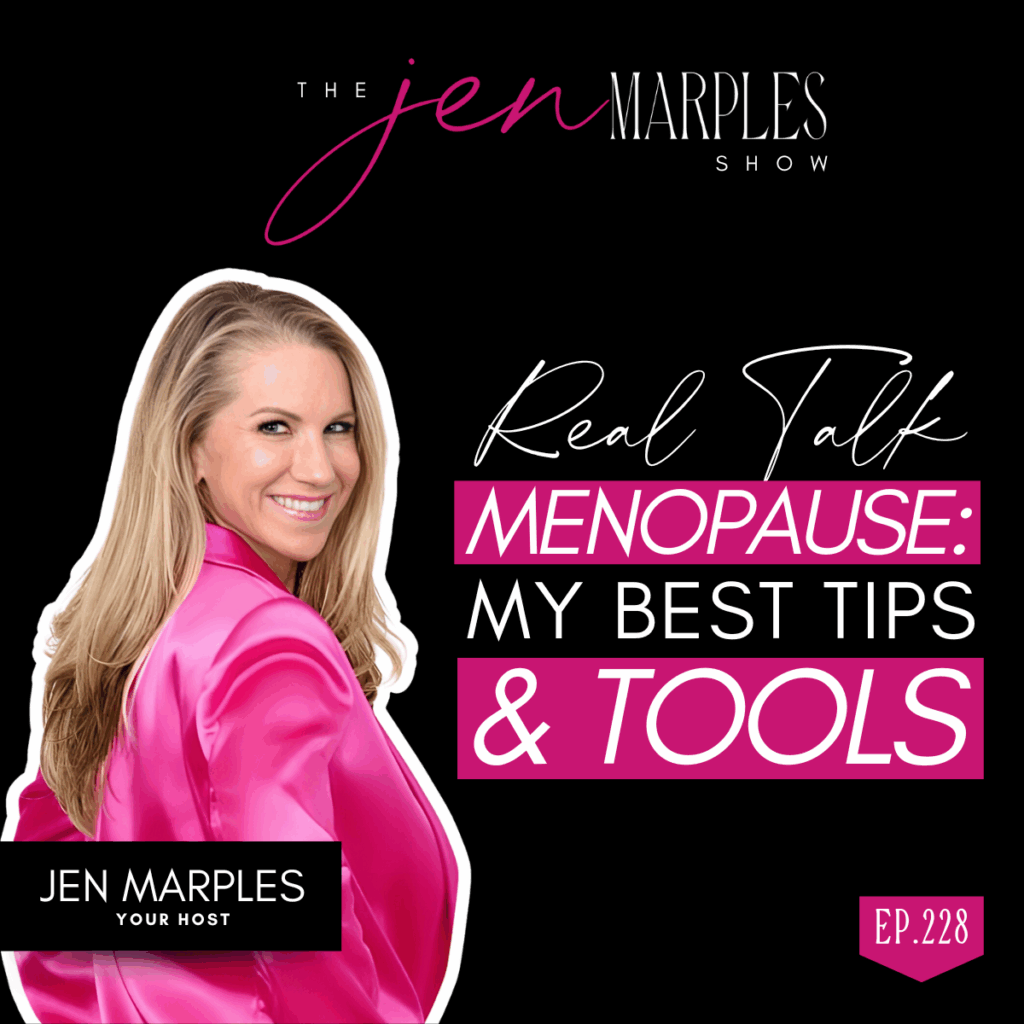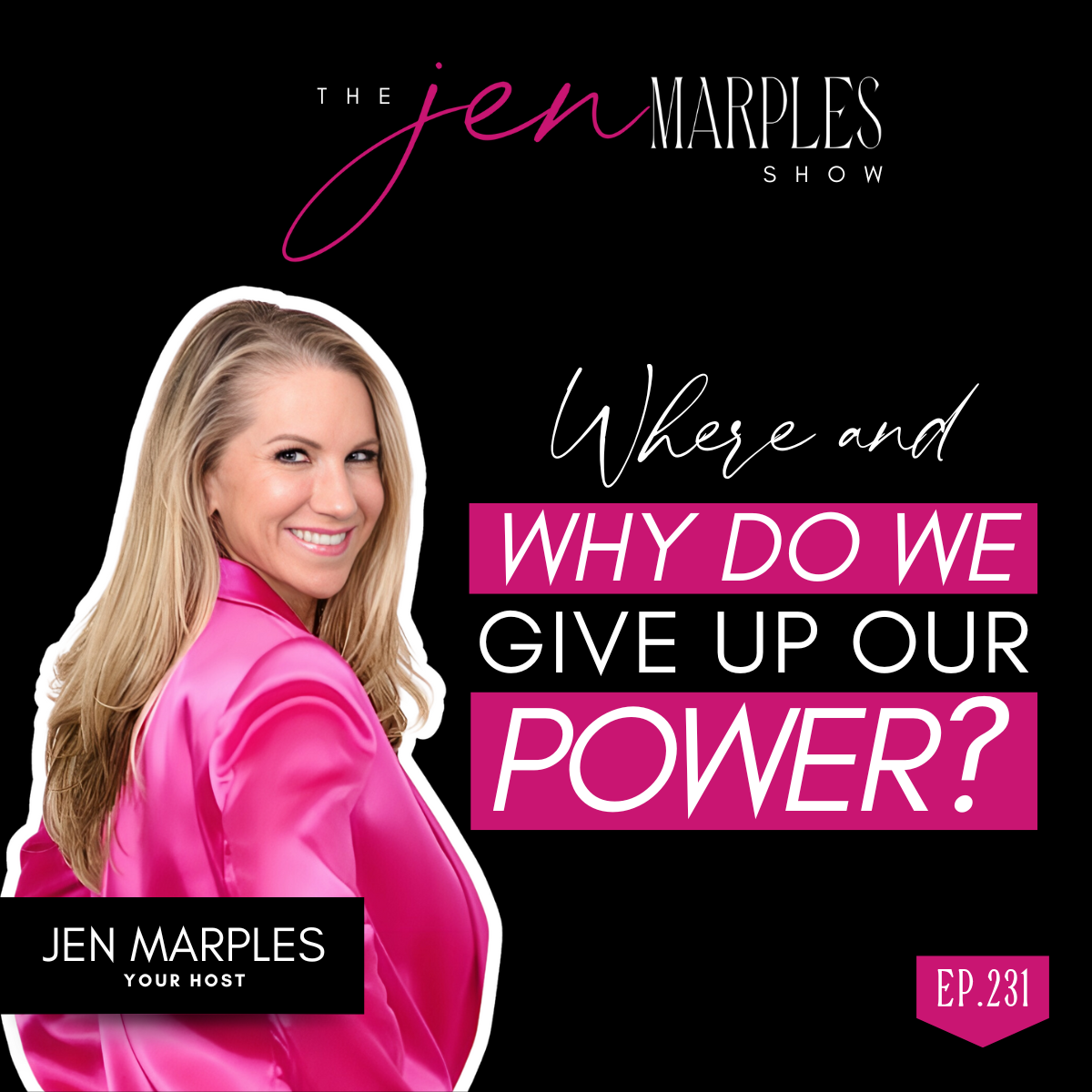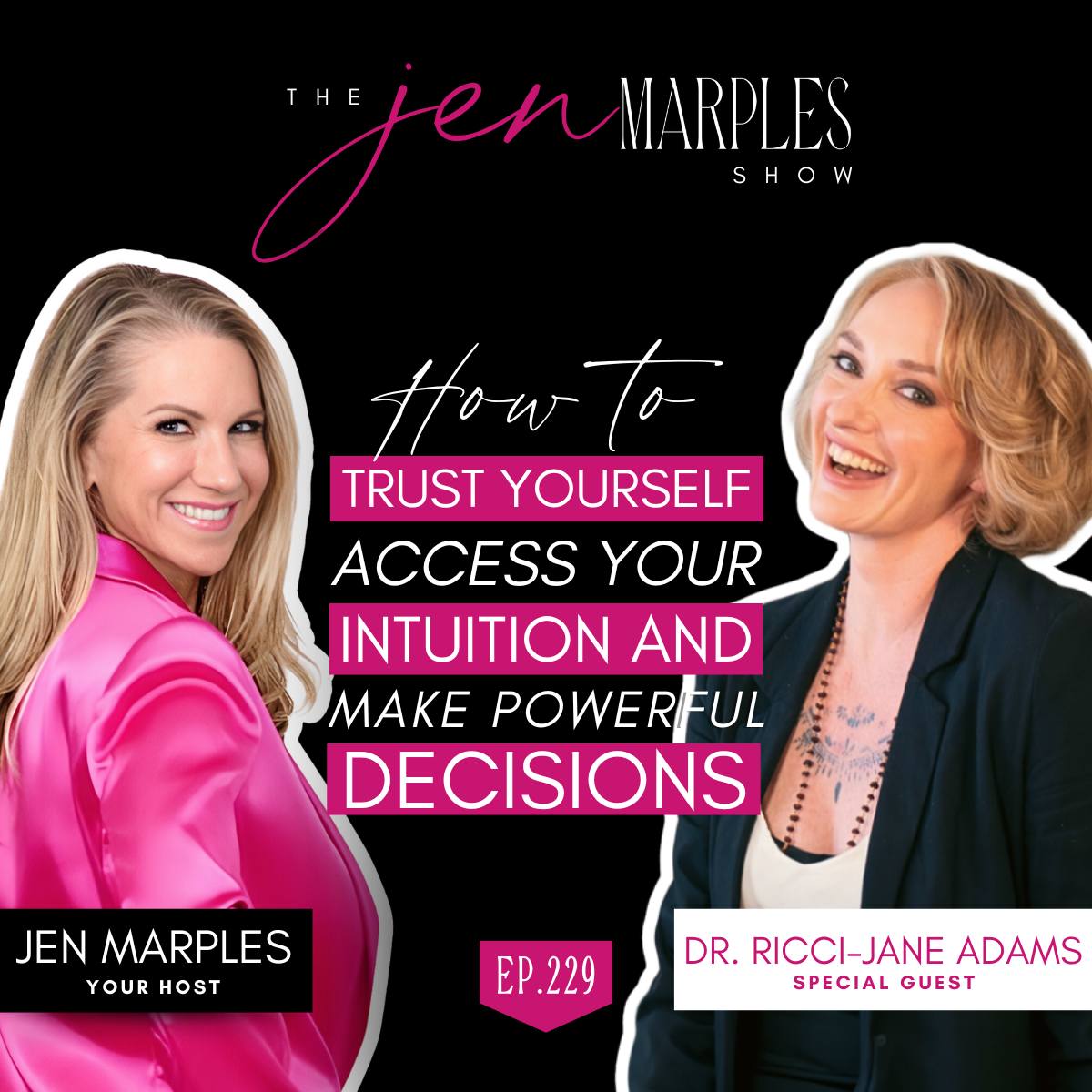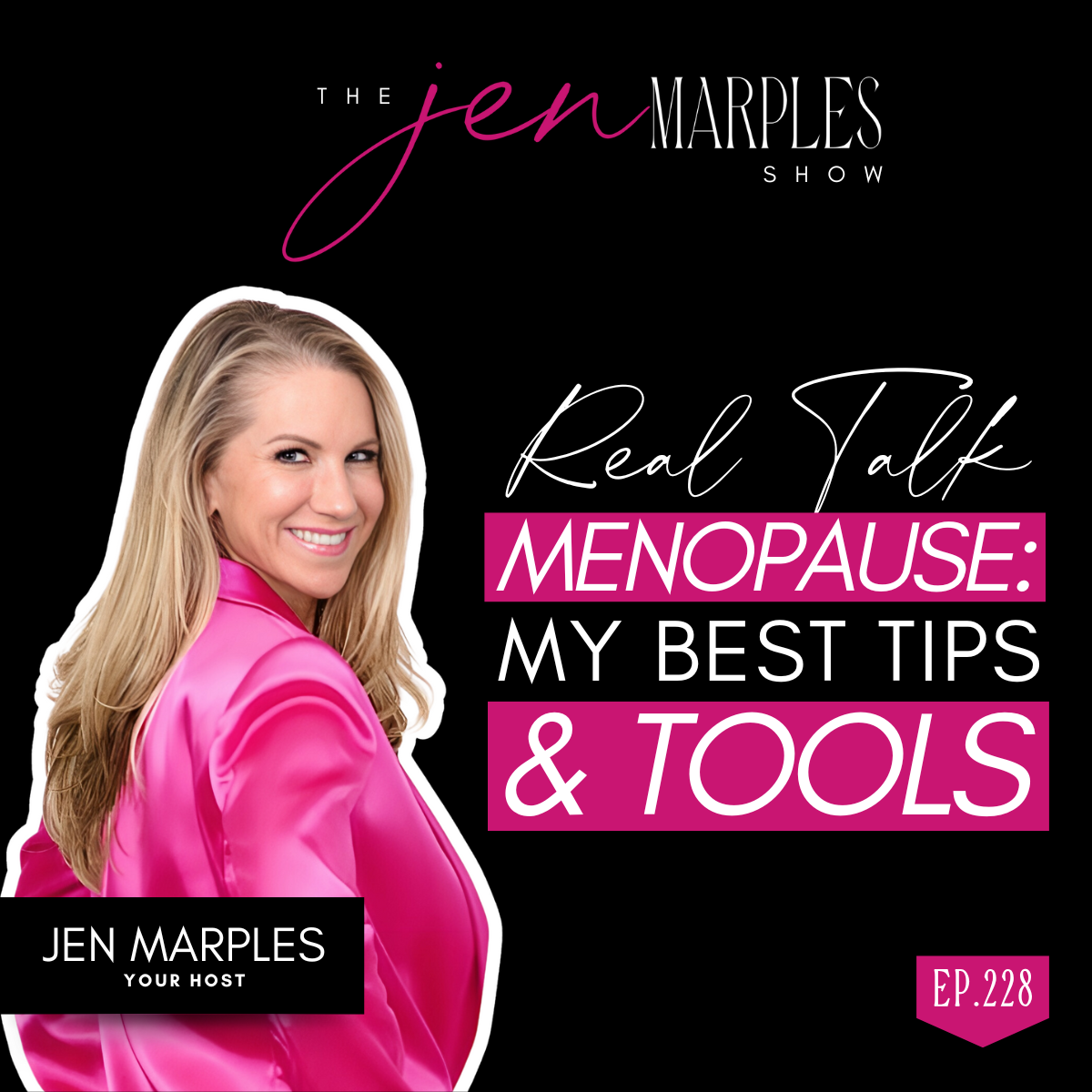
In this special menopause awareness month episode, I’m sharing my best tips, resources, and practical advice for navigating this transformative time. After years of attending health conferences, interviewing menopause doctors, and going through my own journey, I’ve learned that what worked in your 40s won’t work at 50 or 55 as our bodies are constantly evolving. I’m breaking down my favorite resources, from finding the right practitioners to books and tools that have made a real difference.
This episode is packed with actionable advice on getting the support you deserve, why traditional therapy matters as much as hormone therapy, and how to stop white-knuckling your way through midlife. We are all dealing with a lot, so I hope this episode provides some guidance to help you thrive and not just survive menopause and midlife!
Key Takeaways:
- Your body’s needs change constantly in midlife and what works today might not work in six months
- Schedule a separate appointment specifically for menopause discussions and don’t treat it as an aside to your annual exam
- Understanding doctors education and constraints and how this helps you better advocate for yourself
- Understanding your midlife brain and work it to your advantage
- Community and connection are crucial in midlife
Websites & Organizations
- The New Menopause by Dr. Mary Claire Haver
How to Menopause by Tamsen Fadal
- Unbreakable by Dr. Vonda Wright
- Estrogen Matters by Avrum Bluming, MD and Carol Tavris, PhD
- Menopause Boot Camp by Dr. Suzanne Gilberg-Lenz
- The Menopause Moment by Dr. Kelly Casperson
- Millenial Menopause by Lauren Tettenbaum, LCSW, JD, PMH-C
- A New Position on Sex by Juliana Hauser, PhD
- The Upgrade by Dr. Louanne Brizzedine
- Find Your Unicorn Space by Eve Rodsky
Menopause Free Resource:
Tele-Health:
Progesterone Intolerance Video with Dr. Hirsch
Tamsen Podcast for Spouses/Partners to Understand Menopause
Chip Conley with Arthur Brooks on The Midlife Chrysalis Podcast
Past Jen Marples podcasts about Menopause, Nutrition, Wellness
Ep 215 Best of Doctors
Ep 211 with Juliana Hauser
Ep 150 with Dr. Mary Claire Haver
Ep 155 with Dr. Vonda Wright
Upcoming Events:
Nov. 8 UCLA Women’s Wellness Experience: Use code JenMarples for 10% off
Nov. 11 Veronica Beard x Jen Marples Night of Women’s Empowerment to benefit Dress for Success (free to attend!)
Learn more about Jen Marples at https://www.jenmarples.com
Want to work with Jen? Book a complimentary 20-minute call HERE.
Follow Jen @jenmarples on Instagram, LinkedIn, TikTok and YouTube
Subscribe to Jen’s Newsletter
Unedited AI Transcript Here
You’re Not Crazy: A Real Woman’s Guide to Navigating Menopause in Midlife
If you’ve been feeling like something’s “off” but can’t quite put your finger on it—maybe you’re more emotional than usual, struggling with brain fog, or wondering if you’re losing your mind—you’re not alone. And more importantly, you’re not crazy.
October is Menopause Awareness Month, and it’s the perfect time to talk openly about what so many of us are experiencing but suffering through in silence. The truth is, menopause isn’t just about hot flashes and night sweats. It’s a complex, multifaceted transition that affects our bodies, brains, emotions, and relationships in ways we rarely discuss.
Your Body Is Always Changing (And That’s Normal)
Here’s what many women don’t realize: what worked for your menopause symptoms in your 40s might not work in your 50s. Your body is constantly evolving, and the hormonal cocktail that felt perfect last year might need adjusting today.
External stressors—work pressure, aging parents, kids leaving home, or societal expectations—all impact how menopause shows up for you. The key is to stop white-knuckling through the discomfort and seek help when something doesn’t feel right. It might take a few months to find the right combination of hormone therapy, lifestyle changes, or self-care practices, but you don’t have to suffer alone.
Become Your Own Health Advocate
One of the most eye-opening revelations for many women is learning that most doctors receive shockingly little menopause training—sometimes as little as 4 to 40 hours during their entire medical education. This isn’t their fault; it’s a systemic failure in how women’s health is prioritized.
The solution? Approach your healthcare provider as a partner, not just an authority figure. Do your research beforehand using trusted resources like menopause.org, which offers comprehensive information and a directory of menopause-certified practitioners.
Here’s an insider tip: schedule a dedicated menopause appointment rather than trying to discuss it during a routine pap smear or breast exam. Your doctor likely doesn’t have time to address menopause as an aside, and you deserve their full attention.
If you’re feeling dismissed or gaslit—like being told menopause is “all in your head”—that’s a red flag. Find another doctor. And if local options are limited, explore telehealth providers like Pandia Health or Alloy, which can prescribe hormone therapy and other treatments through virtual appointments at reasonable costs.
Your Brain Has Changed (And It’s Not Dementia)
Let’s address the elephant in the room: midlife brain fog is real. Walking into a room and forgetting why you’re there, struggling to recall someone’s name, or having difficulty multitasking the way you used to doesn’t mean you’re stupid or developing dementia. Your brain has literally changed.
Dr. Louann Brizendine’s book “The Upgrade” is essential reading on this topic. For 20+ years, our brains functioned one way—optimized for multitasking, rapid processing, and juggling multiple priorities. In midlife and beyond, our brains shift into what’s actually a wisdom era. We’re not set up for the same type of rapid-fire multitasking anymore, but we’re incredibly equipped for strategic thinking, pattern recognition, and deeper wisdom.
The frustration comes from trying to function like we did at 38. Once you understand how your brain works now, you can work with it instead of against it—and that’s when the magic happens.
Educate Your Partner and Household
One of the most important things you can do is educate the people in your life about what you’re going through. When family members tell you you’re “crazy” or “too emotional,” sit them down and explain that your brain and body have actually changed. This isn’t an excuse—it’s biology.
Share podcasts (like Tamsen Fadal’s menopause episode designed specifically for partners), go on side-by-side walks to discuss what you’re experiencing, and help them understand that you need support, not judgment. When your most important relationships understand how you’re wired now, everything changes.
It’s Not Just Hormones—It’s Everything
Here’s what makes midlife so challenging: it’s impossible to separate what’s chemical, emotional, physical, or situational. Are you overwhelmed because of progesterone? Empty nest syndrome? Career pressure? Aging parents? The answer is often: all of the above.
This is why therapy isn’t a luxury—it’s essential. We need more than massages and manicures (though those are nice too). We need a holistic approach that addresses mind, body, and soul. And we need community connection, which research shows is the #1 predictor of longevity—more than smoking, obesity, or other health factors.
You’re Worth the Investment
Stop suffering in silence. Advocate for yourself. Read books like “The New Menopause” by Dr. Mary Claire Haver or “The Menopause Moment” by Dr. Kelly Casperson. Attend women’s health events. Listen to podcasts. Connect with other women going through this.
Most importantly, remember: you’re not too old to claim everything you desire in midlife. But you can’t do it while feeling like absolute crap. Take the 80/20 approach—do your best with nutrition, exercise, sleep, and stress management without obsessing over perfection.
You deserve to feel good. You deserve support. And you deserve to thrive—not just survive—through this transformative chapter of your life.
Medical Disclaimer: This content is for educational purposes only and is not medical advice. If you need medical advice, please consult your doctor or medical provider.




